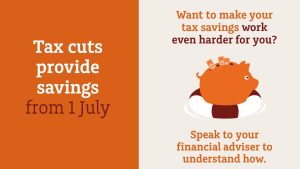How would you rate your financial wellbeing?
It may not be something you think about much. It may even make you uncomfortable to examine the way you manage money and think about whether you’d be able to cope if you suffer a significant financial setback. But your financial wellbeing can impact every area of your life, so it’s worth taking the time to see if there are areas where you could make improvements.
Let’s take a closer look at what financial wellbeing means – and how you can measure yours.
MEASURING FINANCIAL WELLBEING
Ability to meet your regular expenses – like mortgage or rent, utilities, education and health costs.
Being in control of your money – by understanding exactly where your money is going and avoiding wasting it on impulse buys or things you don’t use.
Making choices that allow you to enjoy life – such as travel, hobbies or leisure activities.
Feeling secure now and in the future – with enough money to cover today’s costs while also saving for what might happen later in life – this includes retirement savings, emergency funds and insurance against events like illness, injury or disability.
MAJOR INFLUENCES OF FINANCIAL WELLBEING
Of course, the amount of income you earn is a key factor in your financial wellbeing. But a good wage doesn’t automatically mean you have a high level of financial wellbeing – especially if you’re spending more than you earn.
While you can’t control every factor that influences your financial wellbeing, you can change your financial behaviours and attitudes. Studies show that with the right information and support, people can make positive changes to their financial habits and substantially improve their financial wellbeing2.
MAJOR INFLUENCES OF FINANCIAL WELLBEING
1. KEEP TRACK OF YOUR EXPENSES
Having a budget is key to financial wellbeing. To create a realistic plan, start by tracking your income and spending for a month. Remember to include irregular expenses like utility bills and car registration, or expensive times like Christmas. Once you have a realistic picture of your expenses, you can work out where you can make cuts.
2. SET UP DIRECT DEBITS AND AUTOMATIC TRANSFERS
Use direct debits to cover recurring payments. This can help make sure you cover your essential costs first. It also reduces the amount of time you spend worrying about your finances.
3. HAVE A SAVINGS BUFFER
Having no money set aside for emergencies can be very stressful. So start saving now. Even a tiny bit put away regularly is better than nothing.
4. TALK TO YOUR FAMILY ABOUT MONEY
Having regular, open conversations with your family or partner increases everyone’s financial literacy and understanding. Honest communication about money may also help reduce conflict and stress.
5. GET EXPERT ADVICE
If you would like to know more about how to improve your financial wellbeing, talk to a financial adviser.
FIND OUT MORE
1 Centre for Social Impact & Social Policy Research Centre, UNSW, Exploring financial wellbeing in the Australian context, 2017.
2 Commonwealth Bank, Melbourne Institute and the University of Melbourne, Improving the Financial Wellbeing of Australians, 2018.
Taxation considerations are general and based on present taxation laws and may be subject to change. You should seek independent, professional tax advice before making any decision based on this information. Colonial First State is also not a registered tax (financial) adviser under the Tax Agent Services Act 2009 and you should seek tax advice from a registered tax agent or a registered tax (financial) adviser if you intend to rely on this information to satisfy the liabilities or obligations or claim entitlements that arise, or could arise, under a taxation law.







